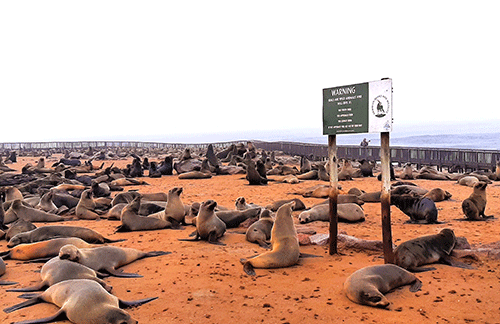WALVIS BAY – There are calls to introduce seal meat to the Namibian market for human consumption as a measure to control and sustainably harvest the country’s seal quota, which is under-utilised.
These were some of the options advanced during a consultative meeting with the parliamentary standing committee on natural resources and stakeholders in the fishing industry in the harbour town of Walvis Bay last week. The meeting follows a parliamentary motion on Namibia’s increasing seal population and its dire ramifications of the fishing sector.
At present, countries such as Japan, Sweden, Norway, Iceland, the Faroe Islands, the Inuit and other indigenous peoples of the United States, Canada and Greenland eat seal meat.
Fisheries biologist Lessyn Kalwenya, who was part of the discussion, was one of the proponents of seal meat consumption.
According to Kalwenya, recent discussion around seals highlighted the possibility of promoting its consumption as one of the ways to address social issues while at the same time controlling the population through responsible harvesting.
“I understand that seal meat is being consumed in towns such as Henties Bay, and that is something we can look into. Farmers are also using the seal oil for their cattle, while the same oil has been processed in capsules of Omega 3 that are consumed by pregnant women. We can produce coats, shoes and bags with their fur. These are all possibilities that as an industry, we can come together and explore,” Kalwenya said.
The biologist is also alive to current challenges faced by the industry, brought upon by, among others, the under-utilised seal quota. “We are not blind to the concern, but it is also no secret that the right holders of the seal quotas are not harvesting their quotas to the fullest. At the same time, there is not much we can do at this stage,” she explained.
Namibia’s seal population is currently estimated at 1.6 million.
A total of 86 000 seals are currently up for harvesting until November this year.
The seal sub-sector is an important contributor to the development and advancement of our people.
The sub-sector has eight right holders, with 86 beneficiaries who are all Namibians, and it currently employs 105 people.
However, no harvesting took place last year.
Plight
Apart from the large volumes of fish consumed by the seals, the Wet Landed Horse Mackerel Association told the committee that seals do not only cause damage to pumps and vessel nets but they also compromise the quality of fish harvested.
“We get approximately two to three seals in the net per drag, which results in significant pump damages and delays in pumping, affecting the quality of the fish in the nets,” the organisation’s chairperson Jason Angela complained.
Meanwhile, Princess Brand Processing general manager Adolf Burger said the Marine Resources Act impresses on sustaining marine resources, which includes seals.
“For instance, an increase in culling of bulls can assist in controlling the seal population. However, killing or scaring off seals during fishing operations is against the law, which used to be the practice during the old days. Nowadays, the seals are familiar with fishing vessels and operations, and they follow vessels and attack the catch once the vessels stop trawling to pump. The fish causes havoc and significant damages to the fish quality, operations as well as equipment,” Burger said.
Meanwhile, chairperson of the committee, Tjekero Tweya, indicated that consultations on seals are crucial as they seek to find lasting solutions. “We are, therefore, here also as follow-up to the first meeting we had in Lüderitz and to fully understand why only a fraction of 25% of the fish stock in Namibian waters are being allocated for human consumption in to keep the fishing sector alive in terms of food security as well as the economy,” the former Cabinet minister said. The Tweya-led committee will also compile a report for tabling in the National Assembly.
“That is why we are here to consult you directly and come up with a solution that will be beneficial for the industry but also promote healthy and sustainable ocean resources,” Tweya said.
-edeklerk@nepc.com.na


